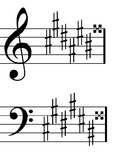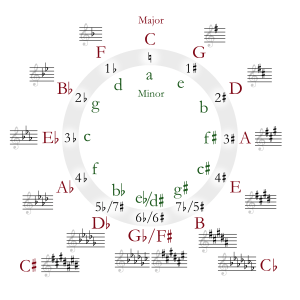G-sharp major is a special kind of major scale in music. A scale is like a musical ladder, a set of notes played in order, going up or down. Major scales usually sound bright and happy. This particular scale starts on the musical note called G sharp.
Every scale has a unique key signature. This tells musicians which notes to play as sharps or flats. The G-sharp major scale has six sharps and one double sharp. A double sharp means you raise a note by two half-steps instead of just one.
To make music easier to read, G-sharp major is often written as its enharmonic equivalent. This means it sounds exactly the same as another key, even though it's written differently. The enharmonic equivalent of G-sharp major is A-flat major. A-flat major has four flats in its key signature, which is simpler to read than six sharps and a double sharp!
Even though A-flat major is more common, G-sharp major does appear in some famous pieces of music. For example, it shows up as a secondary key in works that are already in sharp keys. In Bach's Well-Tempered Klavier, Book 1, the Prelude and Fugue in C-sharp major uses G-sharp major in some parts. Also, the G-sharp minor Prelude and Fugue from the same collection ends with a special chord in G-sharp major. This ending is called a Picardy third, which is when a piece in a minor key ends with a major chord, making it sound brighter.
G-sharp major is also used for short moments in some of Chopin's nocturnes. These are usually dreamy, quiet piano pieces. For example, some of his nocturnes in C-sharp minor briefly use the G-sharp major key.
Understanding Musical Keys
Musical keys help organize the notes in a piece of music. Each key has a specific set of notes that sound good together. The G-sharp major key uses the notes of the G-sharp major scale.
The Circle of Fifths
The Circle of fifths is a helpful diagram that shows how all the different musical keys are related to each other. It helps musicians understand key signatures and how keys move from one to another in a song. G-sharp major is part of this circle, showing its connection to other keys.
|
Diatonic Scales and Keys |
|
|
|
| The table shows the number of sharps or flats in each scale. Minor scales are written in lower case. |








